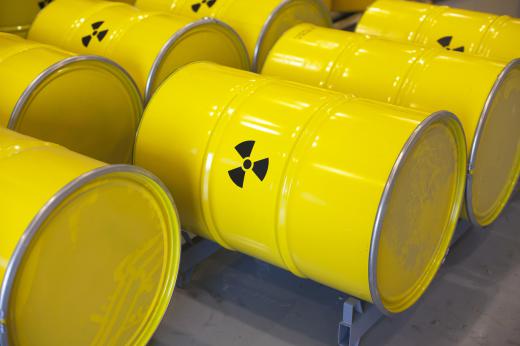Toxic waste is a type of waste that can be hazardous to humans, other living creatures, and plants. The various types of waste materials that fall under this heading can pollute the environment and threaten life in a number of ways. They can be found not only on land, but also in the air and water. When people are exposed to toxic waste, they may become ill or die. Some types of hazardous waste cause cancer, for example, or lead to the development of birth defects; plant and animal life may also face death when exposed to some types of waste.
Radioactive waste is one type of toxic waste. It is produced as a byproduct of other processes, including, but not limited to, those that involve the generation of power. Medical waste is another type of hazardous waste. This includes substances that cannot be disposed of with regular trash, such as blood, body tissues, medical instruments that have touched blood, and medical chemicals. The agricultural industry can also be a source of toxic waste, such as when chemical fertilizers and pesticides contaminate not only the soil, but also groundwater.

Improper chemical waste disposable is yet another contributor to toxic waste. Potentially dangerous chemicals are used in a wide variety of industries and for many different purposes. When they are not disposed of properly, they can harm many different types of life. Even some chemicals that seem innocuous can have devastating effects.
Often, people think of industry as responsible for toxic waste, but individuals are frequently at fault as well. Each time a person fails to dispose of a potentially hazardous item properly he may be contributing to the overall problem. There are many household items a person may need to take extra care with when it comes to disposal. Among them are medications, batteries, cleaning products, pesticides, and electronic devices. Even fluorescent lights can be a source of potential harm if they are not disposed of properly.

Many jurisdictions have laws in place that are supposed to protect humans, animals, and plants from toxic waste. These laws dictate how waste can be disposed of and regulate the generation of toxic waste as byproducts of other processes. Unfortunately, many companies, organizations, and individuals break the law and dispose of hazardous waste in city dumps and in water. Others may do their best to follow regulations but have accidents that cause dangerous pollution.

